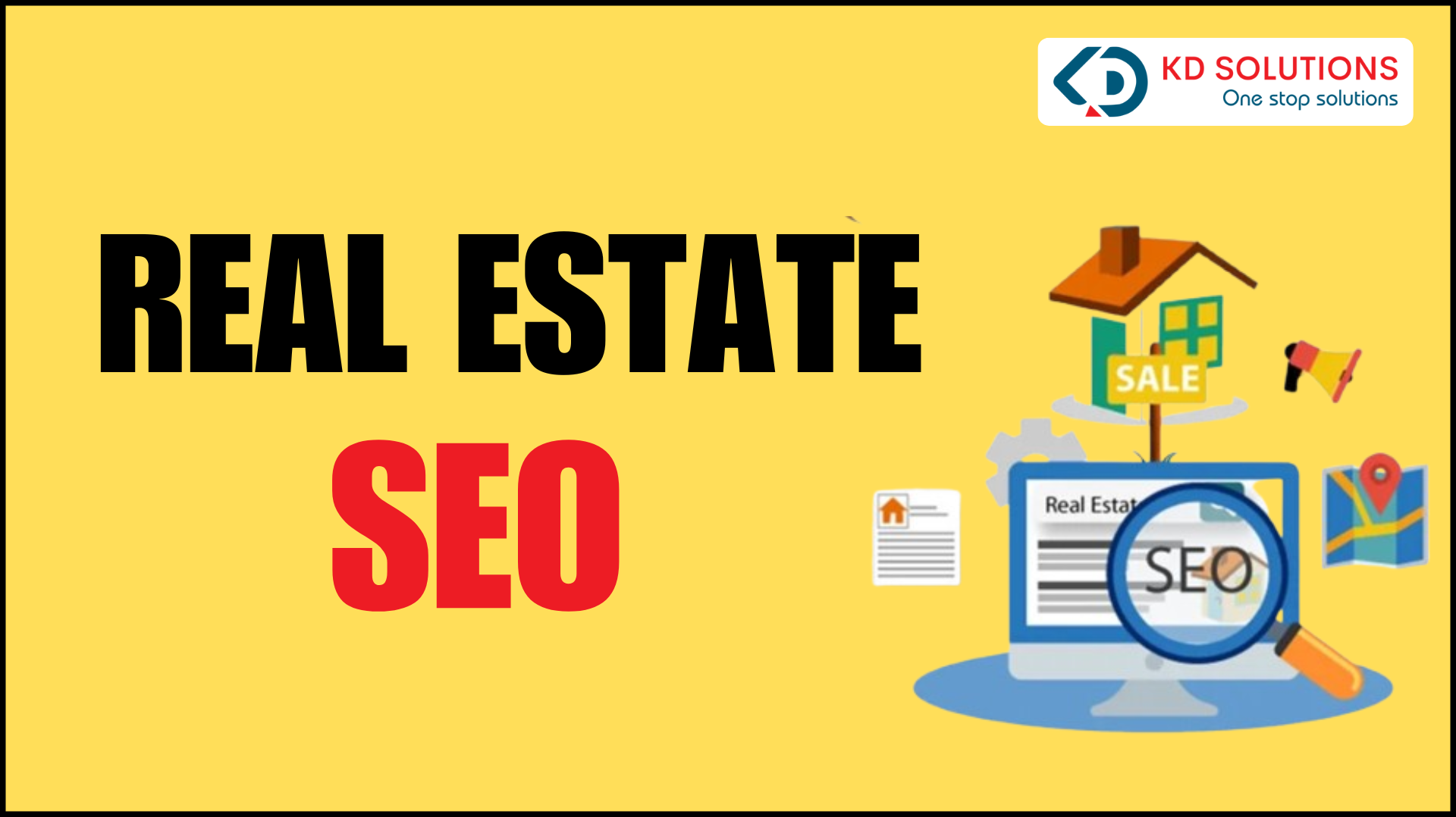
In today’s competitive digital world, Search Engine Optimization (SEO) is an essential tool for real estate businesses looking to enhance their online presence, drive traffic, and convert leads into clients. The real estate industry is increasingly relying on digital marketing strategies to attract potential buyers, sellers, and renters. This makes SEO a fundamental component of any real estate marketing strategy.
Most homebuyers and property investors start their search online. According to studies, over 90% of homebuyers use the internet during their property search. SEO helps real estate businesses to be found by potential clients when they search for properties in your area or specific terms related to real estate. By optimizing your website and content, your business can appear higher in search engine results pages (SERPs), making it more likely that users will visit your site.
When your real estate business ranks higher in search results, it attracts more traffic to your website. Higher visibility means more opportunities to capture leads. By optimizing your website for keywords such as “homes for sale,” “best real estate agent,” or “property for rent,” you can drive highly targeted traffic to your listings. More visitors equate to more potential clients who may contact you for property inquiries or schedule a viewing.
People tend to trust websites that appear at the top of search results. SEO helps to build trust and credibility by ensuring your site is user-friendly, fast, and informative. Real estate businesses that invest in SEO usually have well-optimized websites with high-quality content and relevant information, which improves user experience. This can result in better customer engagement and greater chances of conversion.
Google and other search engines prioritize user experience (UX) as a ranking factor. A well-optimized website for SEO also means it’s designed to be user-friendly. Factors such as fast load times, mobile responsiveness, intuitive navigation, and easily accessible contact information are all part of a strong SEO strategy that enhances user experience. For real estate websites, providing an easy-to-navigate search feature for property listings is crucial. When visitors can find what they’re looking for quickly, it increases the chances they will become clients.
Real estate businesses often serve specific geographic locations. With Local SEO, you can target potential clients in your service area more effectively. Optimizing your website for local search terms (like “real estate in [city]” or “properties in [neighborhood]”) ensures that your business appears in local search results. Additionally, by claiming and optimizing your Google My Business listing, your business can be displayed on Google Maps and local search results, increasing visibility to nearby clients.
Compared to traditional advertising methods like print, TV, or radio ads, SEO offers a more cost-effective way to market your real estate business. Once your site is properly optimized and ranking, it can continue to generate organic traffic without the need for ongoing paid ads. In real estate, where client acquisition costs can be high, SEO allows you to attract clients without relying heavily on paid marketing campaigns, offering long-term, sustainable results.
In the real estate industry, competition is fierce. Many agents, agencies, and developers compete for the same pool of buyers and sellers. By investing in SEO, your business gains an edge over competitors who may not have a solid online presence. When your website ranks higher in search results than competitors, you’re more likely to capture leads and close deals.
SEO is a long-term strategy that targets potential clients at various stages of their buying or selling journey. From the initial search for property information to looking for real estate agents, SEO helps to attract visitors at each stage. With SEO, you can optimize for different types of content, such as blog posts, property listings, buyer guides, or market reports, which can help engage visitors and push them down the sales funnel.
An SEO-optimized website offers more than just visibility—it helps increase conversions. By using SEO strategies such as optimizing landing pages, improving call-to-action (CTA) buttons, and offering valuable content, real estate businesses can improve their conversion rates. SEO is about driving qualified traffic, which ultimately results in more inquiries, property viewings, and successful sales or rentals.
One of the significant benefits of SEO is that it’s measurable. Tools like Google Analytics can track how well your website is performing in terms of traffic, keyword rankings, bounce rates, and conversions. For real estate businesses, this data provides valuable insights into customer behavior and the effectiveness of your marketing efforts. You can analyze which keywords are driving traffic, which listings are generating the most interest, and where improvements can be made to enhance performance.
Real estate SEO involves targeting specific keywords relevant to your audience. By conducting keyword research and optimizing for terms related to property types, areas, and services (e.g., “luxury apartments in [city],” “affordable homes in [area],” or “real estate agents near me”), you can attract highly targeted traffic. These users are actively looking for what you offer, making them more likely to convert into leads.
With the rise in mobile internet usage, it’s critical that your real estate business’s website is optimized for mobile devices. A significant portion of property searches is conducted on smartphones and tablets. Mobile optimization ensures that your website looks good, loads quickly, and functions smoothly on smaller screens. Google’s mobile-first indexing means that websites optimized for mobile devices have a better chance of ranking higher in search results.
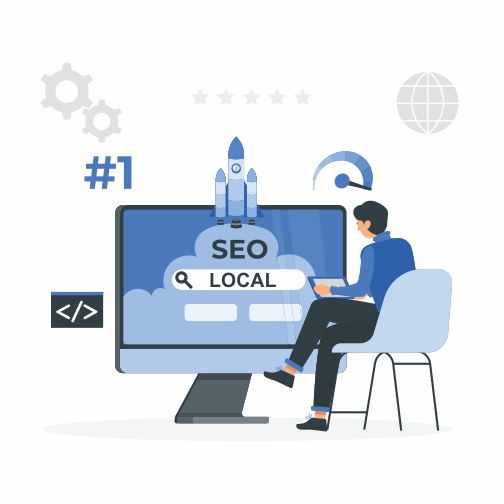
Local SEO is the process of optimizing your online presence to rank higher in search results for local searches. This is important for businesses because it helps them reach customers who are searching for businesses in their area.

WordPress SEO services are services that help you optimize your WordPress website for search engines. This can help you rank higher in search results, which can lead to more traffic and visitors to your website.

Google Maps SEO is the process of optimizing your online presence to rank higher in Google Maps search results. This is important for businesses because it helps them reach customers who are searching for businesses in their area on Google Maps.

International SEO is the process of optimizing your website and online presence for search engines in multiple countries. It’s about making sure your website is visible and relevant to potential customers in all of the markets you want to reach.
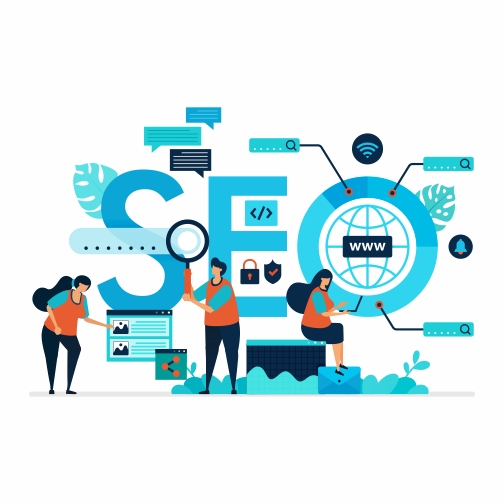
Technical SEO is the process of optimizing the technical aspects of your website to improve its crawlability, indexability, and rendering. This helps search engines understand and index your website more easily, which can lead to higher rankings in search engine results pages (SERPs).

E-commerce SEO services are services that help you optimize your e-commerce website for search engines. This can help you rank higher in search results, which can lead to more traffic and sales for your business.

Industry-wise specific SEO services are services that are tailored to the specific needs of different industries. This is because different industries have different target audiences, different keywords, and different competition levels.

App Store Optimization (ASO) services are services that help you optimize your mobile app for the App Store and Google Play Store. This can help you improve your app’s visibility in the search results, which can lead to more downloads and revenue.
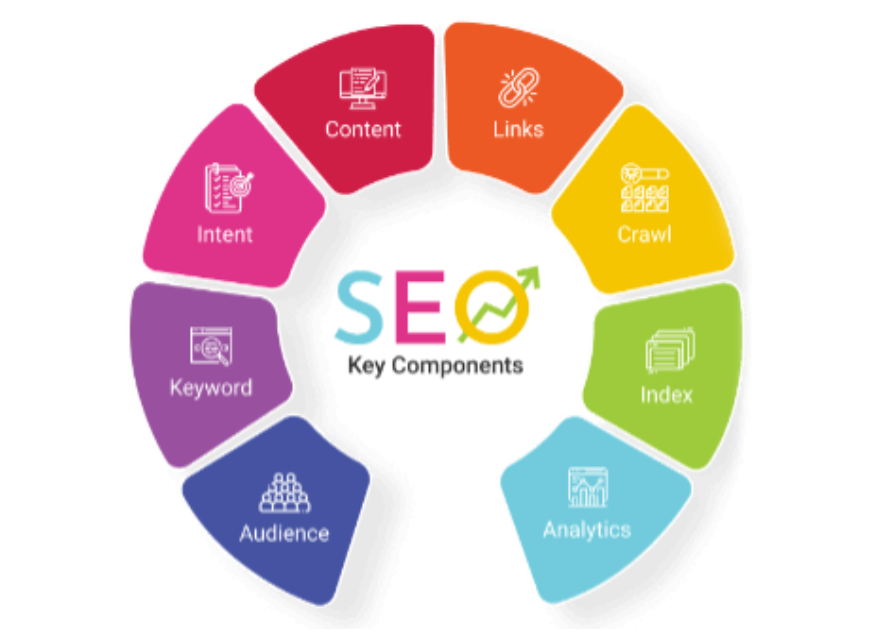
Effective SEO begins with understanding the search terms (keywords) your target audience is using. Keyword research for real estate SEO involves identifying high-traffic terms related to property listings, locations, and real estate services. For example, terms like “buy homes in [City Name],” “real estate agent in [Location],” or “affordable apartments in [Neighborhood]” should be prioritized.
On-page SEO refers to the elements on your website that can be optimized to improve rankings. For real estate websites, this includes optimizing property listings, blog posts, and static pages.
Local SEO is one of the most critical components for real estate businesses since property buyers are often searching for homes within specific regions. Local SEO ensures that your business appears in local searches, particularly in the Google Local Pack.
With more people using mobile devices to search for properties, having a mobile-friendly website is crucial. Google prioritizes mobile-friendly websites in its ranking algorithms, making this a key factor for real estate SEO.
A blog is a powerful tool for improving SEO and attracting organic traffic. Consistently posting relevant, engaging content related to real estate, such as tips for homebuyers, market trends, or neighborhood guides, can position your website as an authority in your field.
A user-friendly website that offers an excellent user experience (UX) can lower your bounce rates and increase engagement, both of which are important ranking factors. Real estate websites should make it easy for users to search for properties, view details, and contact agents.
Technical SEO is the backbone of a well-optimized website. This ensures that search engines can crawl and index your website easily. For real estate websites, it’s important to ensure that property listings and other pages are well-structured.
While social media doesn’t directly impact SEO, it can help drive traffic to your website and enhance your online presence. Sharing property listings, client success stories, and real estate tips can increase your brand’s visibility and generate engagement.
In a crowded digital market, finding the right SEO agency can be challenging. Many SEO companies promise quick rankings, but we focus on sustainable, long-term growth. Our SEO services are designed to not only improve rankings but also enhance user experience, drive qualified traffic, and boost conversions. Here’s what makes us different from other SEO providers in India.
Unlike many SEO companies that apply the same strategy to every business, we create customized SEO plans based on your industry, target audience, and business goals.
We rely on real-time data, competitive analysis, and market trends to craft an SEO strategy that delivers measurable results. Every decision we make is backed by analytics.
We strictly follow Google’s guidelines and implement white-hat SEO techniques to ensure long-term rankings without the risk of penalties.
Many agencies keep clients in the dark about their SEO progress. We provide detailed monthly reports, keyword ranking updates, and analytics insights so you can track your ROI.
Our SEO services prioritize high-quality, engaging, and keyword-optimized content that improves rankings while keeping users engaged.
We go beyond basic SEO by optimizing your website’s technical aspects, including speed, mobile-friendliness, structured data, and site architecture.
Unlike companies that use spammy backlinks, we focus on building high-authority, relevant backlinks that boost your website’s credibility and rankings.
Whether you need to dominate local searches or expand internationally, our SEO agency offers tailored solutions to meet your business needs.
With a team of experienced SEO professionals, we provide one-on-one consultations, strategy planning, and ongoing support to ensure your success.
We have helped businesses across India improve their search rankings, increase organic traffic, and achieve higher conversions with customized SEO solutions.
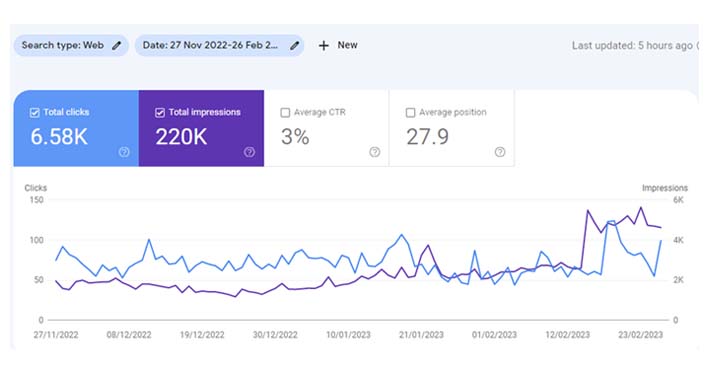
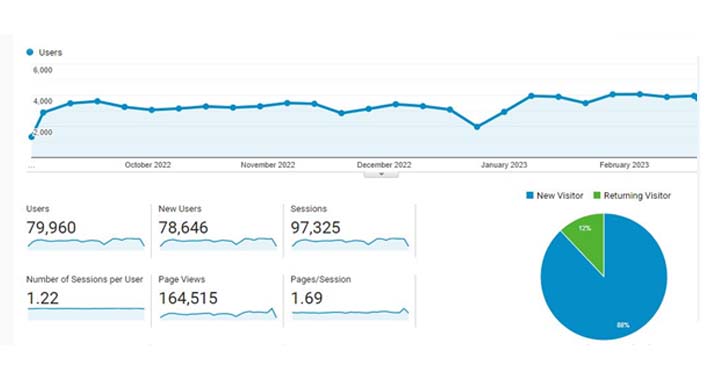
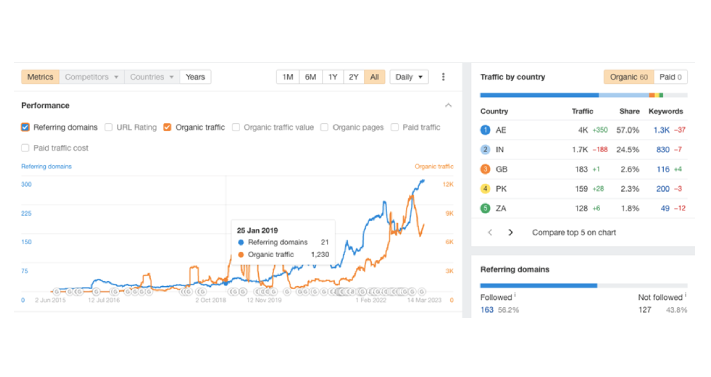
Improving your local Real Estate SEO: Local SEO is especially crucial for real estate businesses, as it helps potential clients find your listings when searching for properties in specific areas. Real Estate SEO can boost your local presence by enhancing your website’s visibility in local search results and encouraging positive reviews from clients, making your properties more accessible to the right audience.
Targeting specific keywords with Real Estate SEO: Real Estate SEO helps you target keywords that are directly relevant to your business and the properties you offer. By optimizing for location-based and property-specific terms, you can reach individuals already interested in purchasing or renting properties in your area, giving you a competitive edge in local search rankings.
Standing out from the competition with Real Estate SEO: The real estate market is highly competitive, making it essential to distinguish your business from others. Real Estate SEO can help you achieve this by improving your online visibility and providing valuable, relevant content that attracts potential clients looking for property solutions. With optimized listings and informative resources, you can position your real estate business as a top choice in the market.
Real Estate SEO (Search Engine Optimization) refers to the process of optimizing a real estate website to rank higher in search engine results for relevant real estate-related keywords. This helps attract more organic traffic, generate leads, and increase visibility for real estate professionals, including agents, brokers, and agencies.
SEO is crucial for real estate websites because it helps increase organic visibility, making it easier for potential buyers, sellers, and renters to find your listings and services online. With the majority of home buyers and sellers starting their search on search engines, SEO ensures that your website appears prominently when they search for relevant keywords.
Real Estate SEO differs from other SEO types in that it focuses specifically on ranking for industry-specific keywords like "buy homes in [city]" or "real estate agents near me." It also involves optimizing property listings, managing local SEO for location-based searches, and addressing unique challenges such as maintaining up-to-date listings and making the website easy to navigate for prospective clients.
Key elements of Real Estate SEO include:
SEO is a long-term strategy, and results can vary. On average, it can take 3 to 6 months to see significant changes in rankings and traffic. However, this depends on factors such as competition in your area, the quality of your SEO efforts, and the frequency of content updates and optimizations.
Yes, Real Estate SEO can significantly help generate more leads. By optimizing your website and content, improving visibility in search engines, and targeting high-intent keywords, you attract potential buyers and sellers who are actively searching for properties or real estate services. This, in turn, can increase inquiries, consultations, and conversions.
To optimize property listings for SEO:
Common mistakes in Real Estate SEO include:
Local SEO is extremely important for real estate businesses since the majority of property searches are location-based. Optimizing your website for local keywords, creating and optimizing your Google My Business profile, and getting local backlinks all play a crucial role in helping you rank higher in local searches and attract clients in your target geographic area.
While social media doesn’t directly impact SEO rankings, it can indirectly help by driving traffic to your website. Sharing your listings, blog posts, or client success stories on social media platforms can increase brand awareness, generate engagement, and encourage visitors to explore your site, ultimately leading to more organic traffic and better SEO performance.
Yes, a blog can be a valuable asset for Real Estate SEO. By publishing informative, keyword-optimized articles about real estate trends, home buying tips, market analyses, and local neighborhood guides, you can attract more organic traffic, position yourself as an authority in the field, and engage potential clients.
Some useful tools for Real Estate SEO include:
The success of Real Estate SEO efforts can be measured using:
Absolutely. Real Estate SEO is effective for businesses of all sizes. For small agencies, focusing on local SEO and niche keywords can help compete with larger companies. Larger firms can benefit from a broader SEO strategy that includes national and international keywords, content marketing, and multi-location optimization.
We work in your platforms, ensuring you have the right processes, tools, data, journeys, and measurement capabilities. We’ll suggest areas where your tech stack can be optimized and condensed.















